17. 21. October read and discuss authors from the Greek – and German-speaking countries. You want to connect, to publish their own works in the other language.
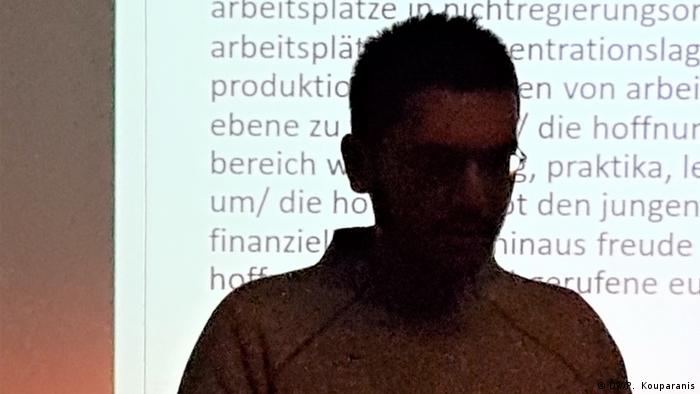
Big read night on Wednesday evening at the home port of Neukölln in Berlin. On the two stages of the theatre’s Poets and Roman authors from their works read. The most spectacular performances were held in the smaller Studio stage. On the programme, performative poetry. The Athens-based Greek Poet of Chechen descent, Jazra Khaleed read his angry charges against injustices in today’s Greece from a seemingly never-ending paper from wool roller.
With a ridiculous speed of the Frankfurt-based Spoken-Word poet Dalibor Markovic moved in his poems seamlessly between German, English, Croatian. And while Katerina Iliopoulou recited her poem cycle “passages”, were the sounds of a drive to listen to ship to. At the opening event of the four-day meeting, “Syn_Energy Berlin_Athens” came from the audience. Around 20 writers, mainly poets, from Germany, Greece, Cyprus, Austria, and Switzerland take part in it.
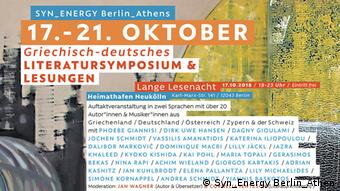
Networks
The event is a combination of evening readings for the General public and author of a conference during the day. It writers to a wide audience less well known and therefore are trying to find ways and forms to publish their works, but also to make them known abroad. For the initiator of the meeting, Michaela Prinzinger, was the willingness to collaborate is a crucial criterion to invite you to Berlin: “the authors have interested to the collective work, and think cooperatively. Those that do not sit alone in your silent room, and for the drawer to produce, but the engage in group formation processes.”
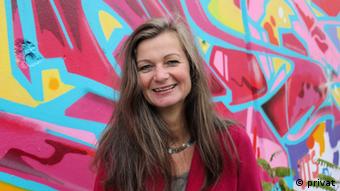
Organizer hopes Prinziger that from the meeting-co –
Michaela Prinzinger has been for years on this path. The renowned Translator of Greek literature into German, as she says, “in desperation,” that you could barely large German publishers for the Greek authors, interested, 2014, the German-Greek Internet platform diablog.eu launched.
Here are just texts, not the Greek, but also German authors, which were translated into the other language. For Michaela Prinziger a success it is, now, when the Berlin Edition Romiosini brings an anthology of Greek poetry with translated texts, which were published on diablog. However, this can be not a permanent solution. Greece must take its funding programme for literature translations into foreign languages. Like so many other measures of culture, has been withdrawn in the economic crisis.
Working together
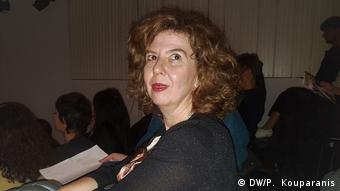
For the Translation of Greek texts: Katerina Iliopoulou
As a bridge Builder, the poet Katerina Iliopoulou, of course. With six other Greek poets, she founded the biannual magazine Farmako (medicine). Here are poems to be published in Greek as well as Translations of texts by foreign poets. However, Katerina Iliopoulou wanted to be Vice versa also, that Greek authors abroad.
Because language is a crucial hurdle in 2009, it established together with the other hand, the Internet platform greekpoetrynow: “as a result, we tried making Greek poetry known abroad and even in the world, with poets in contact, to communicate with you. It has proven itself. It came in since then, numerous meetings both in Greece and abroad.” Now they wanted to work together with German authors.
Well-connected
An address for the German Poet in Greece, the Athenian literary magazine Teflon. She has made a name for itself with the authors from the feminist, and the scene of the undogmatic Left. Your co-editor Jazra Khaleed is on literary festivals worldwide, his poems have been translated into numerous languages. For many years there was a lively contact with the poets of the former dissident scene of the GDR to East Berlin Poet Bert Papenfuß. Translated texts of each other and published them, inviting each other to events.
…and an exception
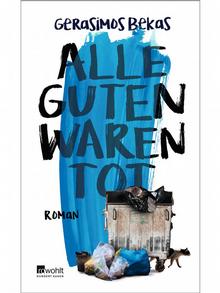
Gerasimos Bekas has done it. His novel will appear in November at the prestigious Rowohlt Verlag
A special case of the invited authors on the “Syn_Energy Berlin_Athens” is Gerasimos Bekas. He does not have to search for a German publisher. His first novel, “All the Good ones were dead” appears at the end of November Rowohlt, one of the largest publishing houses in Germany. “The publisher has convinced the idea of the book,” says Bekas. “A German couple adopts a boy Greeks, in order to overcome the Nazi past of the family.”
Has helped but also that Bekas has mastered as a child of a Greek father and a German mother, both languages perfectly, he does not need to be translated. Moreover, he is in the German literary scene, not Unknown. In 2014 he won the German literature prize Open Mike. He is next to the Klagenfurt Ingeborg-Bachmann prize, the most important competition for German-language literature-new discoveries.
Organizer of the “Syn_Energy Berlin_Athens” diablog.the eu and the house of literature Lettrètage. Is promoted the meeting of the capital cultural Fund and the Stavros Niarchos Foundation. The media partner is the Deutsche Welle.